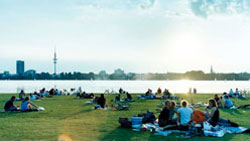Ecology, Economics, Energy, EU – Baltic States, Markets and Companies
International Internet Magazine. Baltic States news & analytics
Thursday, 12.02.2026, 08:31
Clean environment for a modern city
 Print version
Print version |
|---|
Environment as an important denominator for a modern city has been always the main part of city planning and management. At present city’s environment is an essentially aspect of urban society. For the European Green Capital Award 6 cities were selected: Barcelona, Malmö, Nantes, Nuremberg, Reykjavík and Vitoria-Gasteiz.
Major part of European citizens lives in cities presently, i.e. four out of five Europeans are living in towns and cities. Most of the environmental challenges facing societies originate from urban areas. At the same time, the urban areas that bring together the commitment and innovation needed to resolve them.
The European Commission has long recognised the important role that local authorities play in improving the environment, and their high level of commitment to genuine progress. The European Green Capital Award has been conceived as an initiative to promote and reward these efforts.
EU actions and policy
Urban dimension in Community’s environmental policies has become a focal point in the beginning of the present century. Various Directorates-General have cooperated within the Commission Interservice Group on Urban Development to prepare a guide called, "The urban dimension in Community policies for the period 2007-2013". The intention was to produce a user-friendly document explaining the regulatory and financial framework relevant to urban areas.
Thematic “Strategy on Urban Environment” recognising the important role of cities first time appeared in the Commission’s priorities already in 2002 in the 6th Environmental Action program. The latter aims at promotion of a more integrated approach to urban management and supporting cities in their efforts to improve environment quality.
Commission's website provides more guidance and information about integrated environmental management:
More: http://ec.europa.eu/environment/urban/home_en.htm
Evaluation panel
For capital city’s award in 2012 and 2013 the six city finalists are chosen out of 17 candidate cities.
The finalists are Barcelona and Vitoria-Gasteiz from Spain, Malmö from Sweden, the French city of Nantes, Nuremberg in Germany and Reykjavík, the capital of EU candidate country Iceland. The evaluation panel began examining applications on 1 February 2010, and a decision has now been reached on 9th of April 2010. Cities are evaluating the candidate cities against a comprehensive checklist of environmental criteria, which includes the local contribution to the fight against climate change, transport facilities, green urban areas, sustainable land use, nature and biodiversity, local air quality, noise pollution, waste production and management, water consumption, wastewater treatment, and the environmental management of the municipality.
The Commission’s award panel uses 11 environmental indicators; the candidate cities being judged on their record in achieving high environmental standards, their commitment to ongoing goals to further environmental improvement, devotion to sustainable development, the extent to which they can act as a role model to inspire other cities and promote best practice in other European cities. The jury choosing the winners is made up of representatives from the European Commission, the European Environment Agency, Local Governments for Sustainability (ICLEI), the Covenant of Mayors' Office, the European Environmental Bureau and the Committee of the Regions.
Documentation for awards
Applicant cities have been asked to provide information on a variety of indicator areas concerning their present environmental status and improvements in the urban living conditions, future initiatives and dissemination plans. Over the coming months, the six finalists will supply further details to support their applications. When the evaluation panel has assessed the six short-listed cities over the course of the second evaluation round, it will present its recommendations to the jury, which will then make the final decision. The announcement of the European Green Capitals for 2012 and 2013 will be made at a ceremony in Stockholm in late October 2010. Stockholm is the current European Green Capital, with the title passing to Hamburg in 2011.
Annual awards from 2010
The Commission decided that starting from 2010, one European city will be selected each year the European Green Capital of the year. The award is given to a city that:
- has a consistent record of achieving high environmental standards;
- is committed to ongoing and ambitious goals for further environmental improvement and sustainable development;
- can act as a role model to inspire other cities and promote best practices to all other European cities.
The award marks a city's wish and capability to solve environmental problems in order to both improve the quality of life of its citizens and reduce the contribution it makes to the global environment as a whole.
More information on:
http://ec.europa.eu/environment/europeangreencapital/index_en.htm








 «The Baltic Course» Is Sold and Stays in Business!
«The Baltic Course» Is Sold and Stays in Business!

